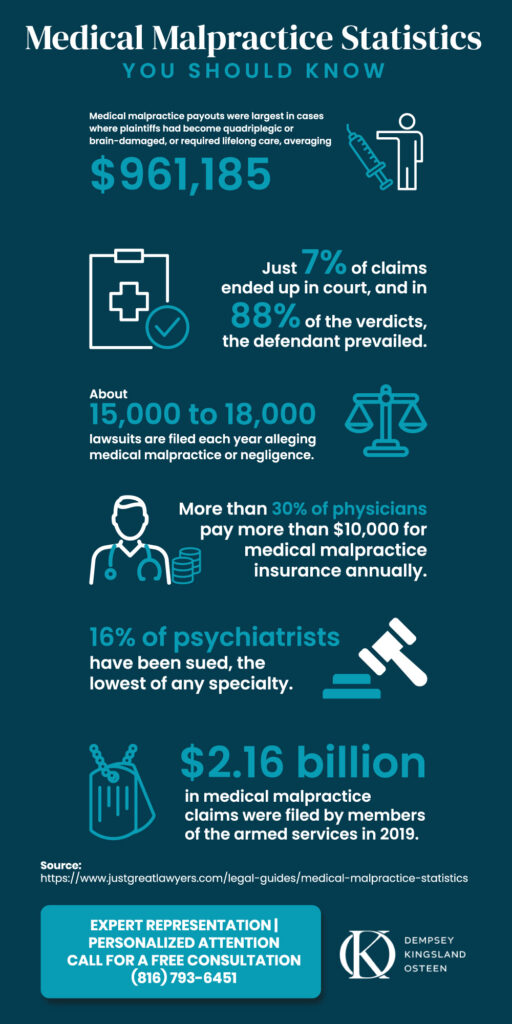Top Medical Malpractice Lawyers in Kansas City Since 1986
Our Malpractice Lawyers Hold Negligent Healthcare Providers Accountable
Searching for a medical malpractice lawyer, Kansas City? Did you recently leave the hospital with a different health problem than the one you were treated for? Did your doctor fail to make a correct diagnosis of your condition early on?
Are your healthcare providers avoiding answering your questions about the bad outcome of your treatment? It may be worth contacting the top medical malpractice attorney in Kansas City.
If you experienced any of the above or some other issue with recent medical treatment, you may have grounds for a medical malpractice claim. When patients are harmed by substandard care, legal representation is vital.
For over 35 years now, the medical malpractice attorneys at Dempsey Kingsland & Osteen have been holding negligent hospitals, doctors, nurses, and medical professionals accountable for their actions
We are a well-respected and well-known law firm that excels in medical malpractice cases. We are also fortunate to have a highly dedicated and talented staff of paralegals and legal assistants to assist us in our work.
In addition, we have a medical team consisting of an accomplished physician and an outstanding registered nurse who work closely with our office.
Seeking a trusted medical malpractice lawyer in Kansas City? Since 1986, Dempsey Kingsland & Osteen has been dedicated to fighting for your rights. Contact us today.
contact usHow Our Medical Malpractice Attorneys Can Help
Medical malpractice takes place when a healthcare provider fails to administer proper treatment, take necessary actions, or delivers subpar care resulting in harm, injury, or fatality to an individual. Typically, such malpractice or negligence centers around a medical mistake.
Medical malpractice can occur in many different ways – that is why Dempsey Kingsland & Osteen takes on a wide variety of medical malpractice cases.
If you have suffered substantial injuries as a result of a negligent action or inaction of a medical professional, our medical malpractice attorneys can help.
Our medical malpractice attorneys in Kansas City know what you are going through. Learn how to talk to a lawyer about medical malpractice here.
We have successfully resolved cases in the categories shown below and others as well:
- Anesthesia errors,
- Brain injuries,
- Catheter/IV errors,
- Defective medical devices(including shoulder pain pumps),
- Doctor errors,
- Emergency room errors,
- Nursing home negligence,
- Pharmacy errors,
- Vaccine litigation,
- Birth injuries,
- Cancer misdiagnosis,
- Dangerous medications,
- Diagnosis errors,
- Inappropriate opiate prescriptions leading to addiction,
- Hospital errors,
- Surgical negligence, and
- X-ray and radiology errors.
Most medical malpractice cases settle out of court, and that is true of the cases that we accept at Dempsey Kingsland & Osteen.
Our ability, experience, reputation, and dedication to excellence produce results. We can also provide you with the answers that you are seeking about the medical care that you or a loved one received.

What Is the Definition of Medical Malpractice?
Medical malpractice occurs when a doctor, nurse, hospital, or other healthcare provider fails to provide care that a reasonable and careful healthcare provider would be expected to provide under the same or similar circumstances. Medical malpractice (medical negligence) can occur in many different scenarios.
In some cases, it is evident that a health care provider has caused injury by reason of substandard care.
In other cases, the medical negligence that resulted in a poor outcome may not be so obvious. If you have experienced a poor outcome that was unexpected, there may be a basis for a case.
How to Prove Fault in a Medical Malpractice Case
In a medical malpractice case, the burden of proof rests with the plaintiff who alleges substandard care on the part of a health care provider. The plaintiff must prove that the health care provider acted negligently so as to cause actual injury.
Proving fault in a medical malpractice case often requires the assistance of an experienced attorney. Medical malpractice cases are often aggressively litigated as health care providers are never eager to admit negligence.
Proving fault in a medical malpractice case requires proof that the health care provider caused injury by failing to do that which a reasonable and careful health care provider should have done under the same or similar circumstances.
Breach of Standard of Care
All health care practitioners, such as medical doctors, nurses, chiropractors, and pharmacists are required to adhere to professional standards of care. If the health care provider fails to adhere to the standard of care, he or she may be found to have been negligent.
Although health care providers are not required to guarantee a satisfactory outcome in the care that they provide, they are required to perform their work such that it satisfies a normal and reasonable level of proficiency.
Proving negligence requires a showing of the following:
- Existence of Duty: The health care provider had a duty to the plaintiff (for example, a doctor/patient relationship).
- Breach of Duty: The health care provider failed to use the requisite knowledge and skills that are used by other health care providers.
- Injury: Injury or harm must result from or be caused by the breach in the standard of care.
- Causation: This breach in the standard of care causes injury or harm to the plaintiff.
To bring a successful medical malpractice lawsuit in Kansas City, you must prove all elements of negligence.
What Are Common Types of Medical Malpractice?
According to the Journal of the American Medical Association (JAMA), medical negligence is the third leading cause of death in the United States, followed closely by deaths resulting from cancer and heart disease.
Medical malpractice also causes serious injuries to thousands of Americans each year. Below are some of the most common types of medical malpractice.
Misdiagnosis / Failure to Diagnose
Usually, one of the first steps of medical treatment is finding a diagnosis. Doctors do make mistakes and can misdiagnose a problem, but that does not necessarily mean it is malpractice.
The patient must experience harm as a result of the misdiagnosis for it to be medical malpractice. And this harm had to result from the health care provider deviating from the standard of care required in the circumstance.
Delay in diagnosis is also a form of medical malpractice, where a health care provider does not diagnose a medical condition within a timely manner, and it results in harm. One such example is when a health care provider does not diagnose an infection which can lead to serious harm or death.
Surgical Error or Unnecessary Surgery
Surgeries require precision and accuracy to be successful. Unfortunately, surgeons or their assistants make errors that injure patients. For instance, a medical tool is left inside the patient’s body, or the wrong kidney is taken out.
Sometimes, the mishandling of medical records can even cause surgery to be done on the completely wrong person. In cases like this, it is obvious to see how the surgical team’s negligence caused harm to the patient.
Anesthesia Error
Anesthesia error goes along with surgery. Anesthesia uses drugs that stop a patient from feeling anything during their surgery. With these powerful drugs, the patient’s response to the anesthesia has to be monitored very closely.
There have been cases where patients have died from an overdose of anesthesia. Some patients have not been given enough and have woken up during surgery.
It is the anesthesiologist’s job to ensure that these things do not happen. If they fail to do so, it may be medical malpractice.
Birth Injury
Childbirth can lead to a number of complications. Both the mother and the child can suffer lifelong consequences and even death if things go wrong.
If harm is caused to either patient by the incompetence of a doctor, then it may be medical malpractice. Examples include failure to monitor the baby in utero or the mother’s blood loss.
Environmental Error
Environmental errors are a rare form of medical malpractice, but they do happen. They occur when harm is caused by the environment of the hospital or medical facility.
This could include things like exposure to bacteria from the ventilator system or machines used during surgery leading to infection.
Medical Product Liability
Doctors rely on medical devices and tools to help them administer treatments. If one of these products fails and causes damage to a patient, this is a type of medical malpractice.
An example of this would be a vein stint that breaks off and causes damage to a patient’s heart. If the manufacturer had known or should have known about this defect, then they acted negligently and are liable to pay damages to victims.
Failure to Treat
This refers to a situation in which the health care provider fails to provide proper treatment such that the patient experiences a poor outcome.
Failure to Warn of Known Hazards
Your doctor has a duty to warn you of the established risks of a procedure or treatment. This duty is referred to as the “duty of informed consent.”
If your doctor decides not to warn you of the potential hazards associated with the recommended treatment, and as a result, you experience complications that you were not aware could be possible, you may have a case.
How to File a Medical Malpractice Claim
If you plan to file a medical malpractice claim, it’s wise to understand what to expect. When you file a lawsuit, you must also file an affidavit of merit with the court within 90 days of a medical malpractice claim.
This affidavit confirms you consulted a qualified medical malpractice expert who agrees that the defendant is liable. Your attorney will likely have this person testify as an expert witness later in litigation.
Once your claim is in litigation, it enters what is known as the discovery phase. Both sides have this time to gather evidence and build their respective cases.
There’s a chance you might have to give testimony under oath in a deposition. Your attorney will request documents and records from the other side and secure impartial expert witnesses who will testify on your behalf regarding medical negligence.
Many medical malpractice claims are resolved before going to trial. That’s because defendants are usually eager to settle if they know you have a strong case with likable expert witnesses.
In these situations, the defendant might approach your lawyer to discuss a settlement. If you cannot reach an amicable settlement, then there’s a chance your case will go to trial.
What Is the Statute of Limitations for Medical Malpractice in Kansas?
In Kansas, the statute of limitations for filing a medical malpractice lawsuit is two years after the date when the injury becomes reasonably ascertainable to the injured person. However, the lawsuit must be filed within four years after the act that led to the injury. This is according to the Kansas Statutes.
There are also multiple situations that could lead to a different statute of limitations, especially those involving minors. Your lawyer will explain the applicable deadline that applies in your case.
Types of Damages in Medical Malpractice Cases
Compensation in a medical malpractice case will vary depending on the individual circumstances of your case.
Medical expenses are the most common type of compensation in a medical malpractice case. You could be entitled to money for your medical expenses to date, plus expected future treatment.
Pain and suffering is often a large component of a medical malpractice claim as well. Pain and suffering is meant to compensate you for your intangible losses, such as physical pain, emotional turmoil, and more.
It’s referred to as intangible because there’s no associated financial proof of loss. If you cannot work, you could receive compensation for your loss of earnings to date. If you will not be able to work in the future, you might also receive compensation for your loss of earning capacity.
Punitive damages are also possible in a medical malpractice case. Courts might award punitive damages in cases where the defendant engaged in grossly negligent acts or intentionally harmful behavior.
Punitive damages are meant to punish the defendants and send a message that hopefully deters similar future behavior.
When you meet with a medical malpractice lawyer in our office, we’ll discuss what damages apply in your case and what we believe your case is worth.
Contact the Top Kansas City Medical Malpractice Lawyer Today
Contact a top Kansas City medical malpractice lawyer for free today. Medical malpractice lawyers should be well-versed in the applicable law, and they should also have an in-depth understanding of the medical issues surrounding your case.
Our Kansas City medical malpractice lawyers have successfully resolved cases that involved many aspects of physician care and nursing care that patients received in and out of hospital settings. Our attorneys have earned millions for our clients.
Our Kansas City lawyers not only negotiate and, where necessary, try medical malpractice cases; they also lecture and publish articles on medical malpractice and trial practice.
If a case involves medical negligence, we do not refer it to other attorneys or seek the help of other lawyers. We handle the case here with our staff from start to finish. In meritorious cases, we can achieve optimal results for you.







